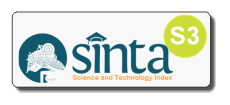Confirmatory Factor Analysis to Measure Teachers’ Emotional Scale in Digital Technology Classroom
Abstract
Full Text:
PDFReferences
Akintayo, O. T., Eden, C. A., Ayeni, O. O., & Onyebuchi, N. C. (2024). Evaluating the Impact of Educational Technology on Learning Outcomes in the Higher Education Sector: A Systematic Review. Open Access Research Journal of Multidisciplinary Studies, 7(2), 052–072. https://doi.org/10.53022/oarjms.2024.7.2.0026
Albion, P. R., Tondeur, J., Forkosh-Baruch, A., & Peeraer, J. (2015). Teachers’ Professional Development for ICT Integration: Towards a Reciprocal Relationship Between Research and Practice. Education and Information Technologies, 20(4), 655–673. https://doi.org/10.1007/s10639-015-9401-9
Alenezi, M., & Akour, M. (2023). Digital Transformation Blueprint in Higher Education: A Case Study of PSU. Sustainability, 15(10), 8204. https://doi.org/10.3390/su15108204
Ali, M. I., Idkhan, A. M., Kamin, Y., & Hasim, A. H. (2022). Implementation of Maximum Likelihood Estimation (MLE) in the Assessment of Pro-Environmental Tools Measurement Models for Engineering Students. International Journal on Advanced Science Engineering Information Technology, 12(4), 1632–1638. https://doi.org/10.18517/ijaseit.12.4.16724
Awofala, A. O. A., Akinoso, S. O., & Fatade, A. O. (2017). Attitudes Towards Computer and Computer Self-Efficacy as Predictors of Preservice Mathematics Teachers’ Computer Anxiety. Acta Didactica Napocensia, 10(3), 91-108. http://dx.doi.org/10.24193/adn.10.3.9
Bogdandy, B., Tamas, J., & Toth, Z. (2020). Digital Transformation in Education During COVID-19: A Case Study. 2020 11th IEEE International Conference on Cognitive Infocommunications (CogInfoCom), 000173–000178. Mariehamn: IEEE. https://doi.org/10.1109/CogInfoCom50765.2020.9237840.
Brown, T. A. (2015). Confirmatory Factor Analysis for Applied Research. New York: Guilford Publications.
Byrne, B. M. (2016). Structural Equation Modeling With AMOS: Basic Concepts, Applications, and Programming. New York: Routledge.
Carcausto, W., Morales, J., Cucho-Leyva, M. P., Alcas-Zapata, N., & Villena-Guerrero, M. P. (2020). Distance Teaching-Learning Experience in Early Childhood Education Teachers During the Coronavirus Pandemic. Advances in Science, Technology and Engineering Systems Journal, 6(1), 269–274. https://doi.org/10.25046/aj060131
Danişman, Ş., Dereli İman, E., Akın Demircan, Z., & Yaya, D. (2016). Examining the Psychometric Properties of the Emotional Regulation Checklist in 4- and 5-Year-Old Preschoolers. Electronic Journal of Research in Educational Psychology, 14(3), 534–556. https://doi.org/10.14204/ejrep.40.15124
Defrianti, D., & Iskandar, I. (2022). The Mastery of Teacher Emotional Intelligence Facing 21st Century Learning. International Journal of Education and Teaching Zone, 1(1), 50–59. https://doi.org/10.57092/ijetz.v1i1.28
Elliot, A. J., & Pekrun, R. (2007). Emotion in the Hierarchical Model of Approach-Avoidance Achievement Motivation. In P. A. Schutz & R. Pekrun (Eds.), Emotion in Education. Burlington: Academic Press. https://doi.org/10.1016/B978-012372545-5/50005-8
Fernández-Batanero, J. M., Román-Graván, P., Reyes-Rebollo, M. M., & Montenegro-Rueda, M. (2021). Impact of Educational Technology on Teacher Stress and Anxiety: A Literature Review. International Journal of Environmental Research and Public Health, 18(2), 548. https://doi.org/10.3390/ijerph18020548
Fix, M., Ritzen, H., Kuiper, W., & Pieters, J. (2020). Make My Day! Teachers’ Experienced Emotions in Their Pedagogical Work With Disengaged Students. Journal of Pedagogy, 11(2), 5–27. https://doi.org/10.2478/jped-2020-0009
Frenzel, A. C., Becker-Kurz, B., Pekrun, R., Goetz, T., & Lüdtke, O. (2018). Emotion Transmission in the Classroom Revisited: A Reciprocal Effects Model of Teacher and Student Enjoyment. Journal of Educational Psychology, 110(5), 628–639. https://doi.org/10.1037/edu0000228
Frenzel, A. C., Pekrun, R., Goetz, T., Daniels, L. M., Durksen, T. L., Becker-Kurz, B., & Klassen, R. M. (2016). Measuring Teachers’ Enjoyment, Anger, and Anxiety: The Teacher Emotions Scales (TES). Contemporary Educational Psychology, 46, 148–163. https://doi.org/10.1016/j.cedpsych.2016.05.003
Goetze, J. (2023). An Appraisal-Based Examination of Language Teacher Emotions in Anxiety-Provoking Classroom Situations Using Vignette Methodology. The Modern Language Journal, 107(1), 328–352. https://doi.org/10.1111/modl.12832
Hadlington, L., & Scase, M. O. (2018). End-User Frustrations and Failures in Digital Technology: Exploring the Role of Fear of Missing Out, Internet Addiction and Personality. Heliyon, 4, 872. https://doi.org/10.1016/j.heliyon.2018
Hagenauer, G., Hascher, T., & Volet, S. E. (2015). Teacher Emotions in the Classroom: Associations With Students’ Engagement, Classroom Discipline and the Interpersonal Teacher-Student Relationship. European Journal of Psychology of Education, 30(4), 385–403. https://doi.org/10.1007/s10212-015-0250-0
Hair, J. F., Black, W. C., Babin, B. J., & Anderson, R. E. (2010). Multivariate Data Analysis: A Global Perspective. Upper Saddle River: Prentice-Hall.
Hanifah, S. S. A., Ghazali, N., Ayub, A. F. M., & Roslan, R. (2023). Predicting Teachers’ Use of Digital Technology. International Journal of Evaluation and Research in Education (IJERE), 12(2), 555. https://doi.org/10.11591/ijere.v12i2.24237
Hung, T.-Y., Liao, H.-C., & Wang, Y. (2021). Development and Validation of a Chinese Version of a School-to-Work Transition Anxiety Scale for Healthcare Students. International Journal of Environmental Research and Public Health, 18(14), 7658. https://doi.org/10.3390/ijerph18147658
Iacolino, C., Cervellione, B., Isgrò, R., Lombardo, E. M. C., Ferracane, G., Barattucci, M., & Ramaci, T. (2023). The Role of Emotional Intelligence and Metacognition in Teachers’ Stress During Pandemic Remote Working: A Moderated Mediation Model. European Journal of Investigation in Health, Psychology and Education, 13(1), 81–95. https://doi.org/10.3390/ejihpe13010006
Johler, M., Krumsvik, R. J., Bugge, H. E., & Helgevold, N. (2022). Teachers’ Perceptions of Their Role and Classroom Management Practices in a Technology Rich Primary School Classroom. Frontiers in Education, 7. https://doi.org/10.3389/feduc.2022.841385
Khalil, A., Ishaq, N., & Boedihartono, A. (2023). Digital Transformation of Teacher Education by Bridging Digital Divide Between Teacher Educators and Prospective Teachers. Journal of Contemporary in Teacher Education (JCTE), 4, 1-20. https://doi.org/10.58444/jcte.v4i.208
Klassen, R. M., Yerdelen, S., & Durksen, T. L. (2013). Measuring Teacher Engagement: Development of the Engaged Teachers Scale (ETS). Frontline Learning Research, 1(2), 33–52. https://doi.org/10.14786/flr.v1i2.44
Kline, R. B. (2023). Principles and Practice of Structural Equation Modeling. New York: Guilford Publications.
Liu, H., Li, H., & Fang, F. (2024). “Behind the Screen, I Still Care About My Students!”: Exploring the Emotional Labour of English Language Teachers in Online Teaching During the COVID-19 Pandemic. International Journal of Applied Linguistics, 34(2), 450–465. https://doi.org/10.1111/ijal.12501
Ma, P., Zhang, L., Dong, H., & Yu, J. (2023). The Relationships Between Teachers’ Emotional Labor and Display Rules, Trait Emotions, Exhaustion, and Classroom Emotional Climate. Frontiers in Psychology, 14. https://doi.org/10.3389/fpsyg.2023.957856
Milawati, & Sholeh, M. (2020). Teacher’s Readiness in Using Digital Technology for Learning in Samarinda City High School. Proceedings of the 2nd International Conference on Social Science and Character Educations (ICoSSCE 2019), 321–324. Atlantis Press. https://doi.org/10.2991/assehr.k.200130.064
Moesarofah, Hitipeuw, I., Murwani, F. D., & Pali, M. (2023). Research on Factors that Influence College Academic Performance: A Structural Equation Modelling Approach. European Journal of Educational Research, 12(1), 537–549. https://doi.org/10.12973/eu-jer.12.1.537
Molotsi, A., Moodley, K., & Van Wyk, M. (2023). Grade 9 Teachers’ Experience of Digital Technologies in the Classroom. South African Computer Journal, 35(1). https://doi.org/10.18489/sacj.v35i1.1098
Msila, V. (2022). Higher Education Leadership in a Time of Digital Technologies: A South African Case Study. International Journal of Information and Education Technology, 12(10), 1110–1117. https://doi.org/10.18178/ijiet.2022.12.10.1728
Naylor, D., & Nyanjom, J. (2021). Educators’ Emotions Involved in the Transition to Online Teaching in Higher Education. Higher Education Research & Development, 40(6), 1236–1250. https:// doi.org/10.1080/07294360.2020.1811645
Nisa, M. U., Fatima, Z., & Zulfiqar, S. (2023). Impact of Teachers’ Emotional Intelligence in Large Classes. Journal of Business and Social Review in Emerging Economies, 9(3), 159–168. https://doi.org/10.26710/jbsee.v9i3.2687
Owens, J. K., & Hudson, A. K. (2021). Prioritizing Teacher Emotions: Shifting Teacher Training to a Digital Environment. Educational Technology Research and Development, 69(1), 59–62. https://doi.org/10.1007/s11423-020-09921-y
Pekrun, R. (2006). The Control-Value Theory of Achievement Emotions: Assumptions, Corollaries, and Implications for Educational Research and Practice. Educational Psychology Review, 18(4), 315–341. https://doi.org/10.1007/s10648-006-9029-9
Pekrun, R., Goetz, T., Titz, W., & Perry, R. P. (2002). Academic Emotions in Students’ Self-Regulated Learning and Achievement: A Program of Qualitative and Quantitative Research. Educational Psychologist, 37(2), 91–105. https://doi.org/10.1207/S15326985EP3702_4
Pradana, B. G. V., & Mayasari, A. (2023). Digital Transformation: The Role of the Big Five Personality Traits. Jurnal Pendidikan Ekonomi Dan Bisnis (JPEB), 11(01), 66–79. https://doi.org/10.21009/JPEB.011.1.6
Reinhold, F., Strohmaier, A., Finger-Collazos, Z., & Reiss, K. (2021). Considering Teachers’ Beliefs, Motivation, and Emotions Regarding Teaching Mathematics With Digital Tools: The Effect of an In-Service Teacher Training. Frontiers in Education, 6. https://doi.org/10.3389/feduc.2021.723869
Richards, J. C. (2022). Exploring Emotions in Language Teaching. RELC Journal, 53(1), 225–239. https://doi.org/10.1177/0033688220927531
Rosdi, A. M., Khalid, F., & Rasul, M. S. (2020). Factors Influencing the Formation of Teacher Professional Identity in Technology Integration. Journal of Educational and Social Research, 10(5), 1. https://doi.org/10.36941/jesr-2020-0082
Sánchez-Cruzado, C., Santiago Campión, R., & Sánchez-Compaña, M. T. (2021). Teacher Digital Literacy: The Indisputable Challenge after COVID-19. Sustainability, 13(4), 1858. https://doi.org/10.3390/su13041858
Scherer, R., Tondeur, J., Siddiq, F., & Baran, E. (2018). The Importance of Attitudes Toward Technology for Pre-service Teachers’ Technological, Pedagogical, and Content Knowledge: Comparing Structural Equation Modeling Approaches. Computers in Human Behavior, 80, 67–80. https://doi.org/10.1016/j.chb.2017.11.003
Schreiber, J. B., Nora, A., Stage, F. K., Barlow, E. A., & King, J. (2006). Reporting Structural Equation Modeling and Confirmatory Factor Analysis Results: A Review. The Journal of Educational Research, 99(6), 323–338. https://doi.org/10.3200/JOER.99.6.323-338
Shao, K., & Parkinson, B. (2024). Social Psychological Accounts of Peer Emotion Transfer in EFL Classrooms: A Doubly Latent Multilevel Analysis. Language Teaching Research, 28(2), 654–678. https://doi.org/10.1177/13621688211011513
Shi, Y., Gu, H., & Wang, Q. (2023). A Case Study of College English Teachers’ Emotional Experiences in the Blended Teaching Context. Frontiers in Psychology, 14. https://doi.org/10.3389/fpsyg.2023.1303819
Shin, H., & Ryan, A. M. (2017). Friend Influence on Early Adolescent Disruptive Behavior in the Classroom: Teacher Emotional Support Matters. Developmental Psychology, 53(1), 114–125. https://doi.org/10.1037/dev0000250
Solheim, K. (2019). Teachers’ Aspirations to Improve their Classroom Interaction. International Journal of Learning, Teaching and Educational Research, 18(6), 147–169. https://doi.org/10.26803/ijlter.18.6.9
Tafarini, M. F., Yazid, M., Suryadi, F. X., Prayitno, B., Faizal, M., & Purba, K. F. (2022). The Development of Instruments for Farmers’ Participation in Water Management in Tidal Lowlands Using Confirmatory Factor Analysis. Emirates Journal of Food and Agriculture, 34(9), 773–783. https://doi.org/10.9755/ejfa.2022.v34.i9.2936
Valente, S., & Lourenço, A. A. (2020). Conflict in the Classroom: How Teachers’ Emotional Intelligence Influences Conflict Management. Frontiers in Education, 5. https://doi.org/10.3389/feduc.2020.00005
Vaskov, M., Isakov, A., Bilovus, V., Bulavkin, A., & Mikhaylenko, N. (2021). Digital Literacy of Modern Higher Education Teachers. E3S Web of Conferences, 273, 12035. https://doi.org/10.1051/e3sconf/202127312035
Ventouris, A., Panourgia, C., & Hodge, S. (2021). Teachers’ Perceptions of the Impact of Technology on Children and Young People’s Emotions and Behaviours. International Journal of Educational Research Open, 2, 100081. https://doi.org/10.1016/j.ijedro.2021.100081
Wang, H., & Song, N. (2022). Why Emotions Need to Labor—Influencing Factors and Dilemmas in the Emotional Labor of Chinese English Teachers Teaching Online. Frontiers in Psychology, 13. https://doi.org/10.3389/fpsyg.2022.981500
Wu, C., Gong, X., Luo, L., Zhao, Q., Hu, S., Mou, Y., & Jing, B. (2021). Applying Control-Value Theory and Unified Theory of Acceptance and Use of Technology to Explore Pre-service Teachers’ Academic Emotions and Learning Satisfaction. Frontiers in Psychology, 12. https://doi.org/10.3389/fpsyg.2021.738959
Zhao, Y., Pinto Llorente, A. M., & Sánchez Gómez, M. C. (2021). Digital Competence in Higher Education Research: A Systematic Literature Review. Computers & Education, 168, 104212. https://doi.org/10.1016/j.compedu.2021.104212
Zizikova, S., Nikolaev, P., & Levchenko, A. (2023). Digital Transformation in Education. E3S Web of Conferences, 381, 02036. https://doi.org/10.1051/e3sconf/202338102036
DOI: http://dx.doi.org/10.17977/um023v14i12025p%25p
Refbacks
- There are currently no refbacks.
Copyright (c) 2025 Jurnal Sains Psikologi

This work is licensed under a Creative Commons Attribution 4.0 International License.
Reference Manager :
|
Aliansi:
Plagiarism Checker :
This work is licensed under a Creative Commons Attribution 4.0 International License.




1.png)








